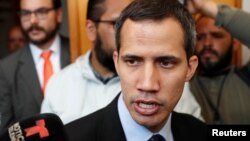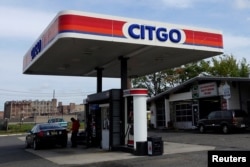Venezuelan opposition leader Juan Guaido is calling on the international community to back his efforts to force embattled President Nicolas Maduro from power and restore democracy to the South American nation.
Guaido, the president of the opposition-controlled National Assembly, declared himself interim president last week after the Assembly declared that Maduro's re-election last May was illegitimate, as most either boycotted the race or were prevented from running. The United States has recognized Guaido as the country's interim leader.
In an opinion piece for The New York Times Thursday, Guaido said over 50 countries have either recognized him as interim president or the National Assembly as the legitimate authority in Venezuela, and has appealed to U.N. Secretary-General Antonio Guterres for humanitarian assistance. He says he has begun the process of appointing ambassadors and "locating and recovering national assets tied up abroad."
Guaido claims he has held "clandestine meetings" with members of the military to convince them to withdraw their support for Maduro, which he says is "crucial to enabling a change in government."
Venezuelans took to the streets of Caracas Wednesday in response to Guaido's call for a peaceful, two-hour, midday protest "to demand that the armed forces side with the people." He is offering amnesty to soldiers who back his movement and reject Maduro's socialist government.
"Mr. Maduro no longer has the support of the people," Guaido writes.
During an interview with Russia's RIA news agency Wednesday, President Maduro says he is ready to hold talks with the country's opposition forces and hold early legislative elections. But he rejected Guaido's demands to also hold a new presidential election before 2025.
The White House says President Donald Trump expressed his "strong support" for efforts to restore democracy in Venezuela during a conversation Wednesday with Guaido.
White House Press Secretary Sarah Sanders said Trump and Guaido also committed to maintaining "regular communication to support Venezuela's path back to stability, and to rebuild the bilateral relationship" between the two countries.
Trump issued a tweet earlier Wednesday acknowledging Maduro's offer to negotiate with Guaido, but warned Americans not to travel to Venezuela "until further notice."
Five foreign journalists have been detained by Venezuelan authorities covering the deteriorating political situation.
A Spanish reporter and a Colombian television producer working for the Spanish news agency EFE were detained Wednesday, a day after the arrest of two French television journalists were arrested in Caracas. Two Chilean television journalists were detained for several hours Tuesday before they were expelled from the country.
The collapse of world energy prices, corruption and failed socialist policies have created an economic and humanitarian crisis in oil-rich Venezuela.
Food, fuel and medicine are in extremely short supply. Inflation is out of control. Millions of Venezuelans have fled the country, and Maduro has shown little tolerance for opposition-led protests.
Maduro has blamed his country's woes on the United States, which he accuses of working with the opposition to topple the government. He has called world leaders who want him gone "Trump sycophants."
The Trump administration has imposed sanctions on PDVSA, Venezuela's government-owned oil company. The sanctions announced Monday will freeze any assets the state-owned PDVSA has in the United States, and bars U.S. firms and citizens from doing business with it.
PDVSA's U.S.-based subsidiary, Citgo, which refines Venezuelan oil and sells Citgo brand gasoline in the U.S., will continue to operate as usual. But any money Citgo earns will be placed in a blocked account.
Maduro said the United States is trying to "steal" Citgo from Venezuela.
U.S. Treasury Secretary Steven Mnuchin said Venezuela can get relief from the sanctions when control of the oil company is turned over to Guaido.












